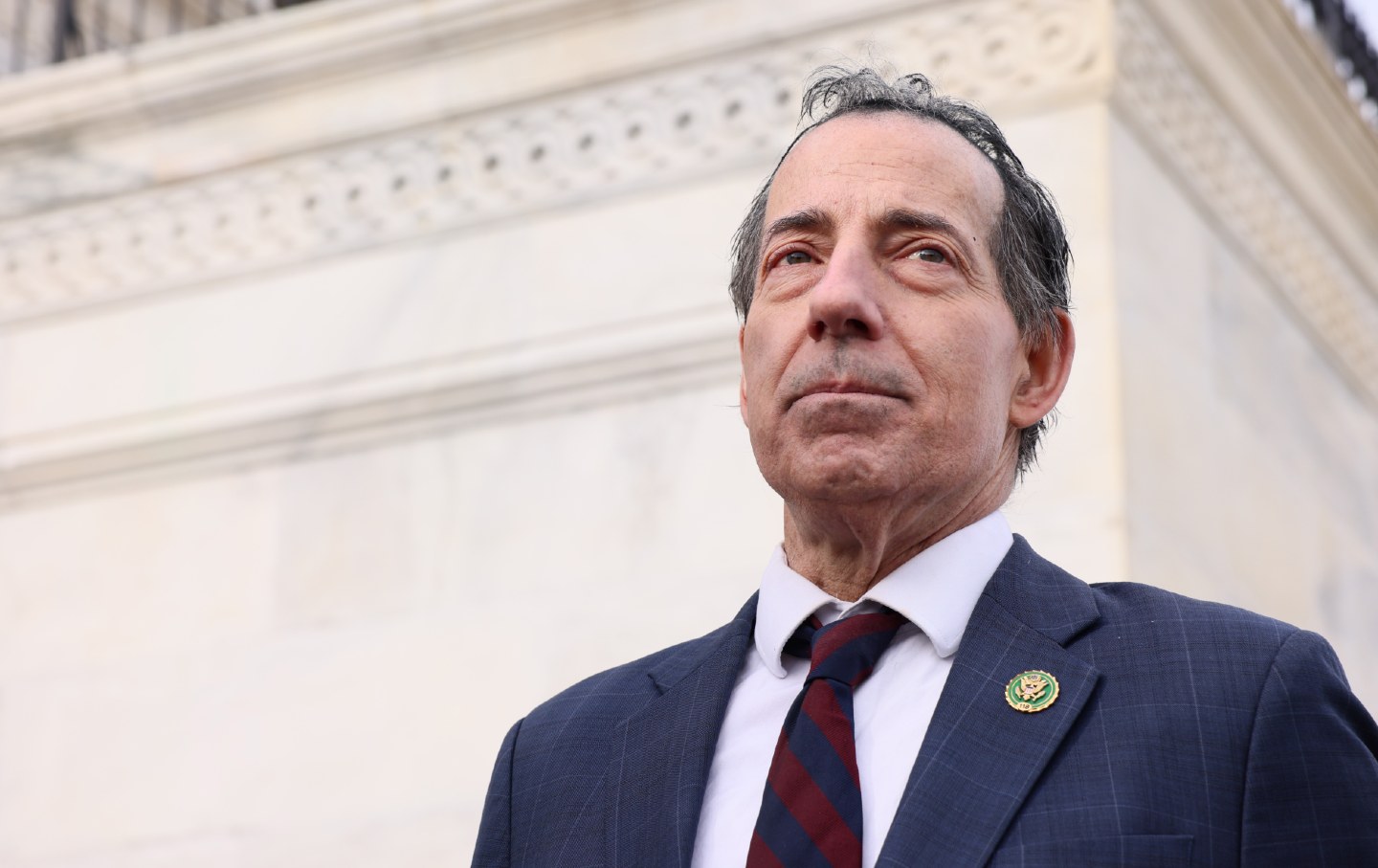
(Jemal Countess / Getty Images for Congressional Integrity Project)
Maryland Representative Jamie Raskin is fond of calling his party the Democracy Party and stressing that his constituency is really the small-d democracy now imperiled by the Trump administration’s systematic assault on privacy protections, government agencies, and constitutional principles. Raskin, a former constitutional law professor, has been helping to organize the Democrats’ legal and political counterattack, most recently as a member of the Democratic House caucus’s Rapid Response Task Force and Litigation Working Group, focusing on the torrent of crimes and constitutional trespasses authored by the Trump White House. He formerly served as a floor manager of Trump’s second impeachment in 2021, and as a member of the Select Committee to Investigate the January 6th Attack on the US Capitol. He is now the ranking member of the House Judiciary Committee. I spoke with Raskin as Congress prepared to recess.
—Chris Lehmann
Chris Lehmann: Can you tell me more about this rapid-response team that was announced yesterday; how did it come to pass, and what’s its mandate?
Jamie Raskin: They are definitely flooding the zone in the White House, but there’s also a method to the madness as they try to dismantle a whole range of federal agencies that actually help people and deliver goods and services. And so we are organized to flood the zone back, and that entails popular protest and education, muscular legislative opposition in every nook and cranny of the institution, and then litigation all over the country.
CL: In terms of flooding the zone, I think the Republicans have given the Democrats an invaluable political asset, which is a villain in the person of Elon Musk. It’s not the familiar villain you’ve had with Trump. I think he’s much more vulnerable, because he’s frankly stupid and insecure and easily rattled. So it just feels like you’ve got the richest man in the world as a fat target in the middle of all this.
JR: Yes, I think that’s right. He’s the perfect villain, embodying the plutocratic and oligarchical takeover of the American government. And there’s a lot of talk about impeaching him as an officer of the United States.
CL: You’re now pursuing a civil class-action suit against Musk and DOGE, employing this 1986 computer hacking law.
JR: Yes. There’s a civil, private right-of-action remedy built into the Computer Fraud and Abuse Act of 1986. So as soon as it becomes clear what the damages are from the seizure, corruption, and leakage of all this data, we can pursue a nationwide class action against him.
So, look, on the litigation front, we’re feeling good about all of the victories we’re racking up on a daily basis. And as far as I know, the only real win that they’ve gotten is a rejection of standing for the union in Boston [in the challenge to the Trump administration’s mass buyout offer to federal employees]. But in the meantime, the AID suit won an injunction, the FBI suit won an injunction, the NIH suit has an injunction. So the rule of law right now is holding, and I know everybody’s question is what happens when they defy the injunctions—
CL: That literally is my next question. JD Vance said in an interview a couple of years ago that Trump should follow the Andrew Jackson precedent in the bank fight and say, “The court has issued its injunction. Now let the court enforce it.”
JR: Actually, if you look that up, that seems to be a false or apocryphal story. Nobody can ever actually nail down that he really said that. But look, I agree—we have to wonder about what political tactics would be used against an utterly lawless and intransigent administration. But there’s so much the courts can do before we get to that point. Courts are used to parties like Donald Trump, who think they can get away with anything.
CL: He spent a good deal of his life prior to his presidency in court.
JR: That’s right—but nobody should forget that Trump has lost hundreds of millions of dollars in court actions, and he, of course, is a convicted felon. So he might like to strike the pose of a Superman who flies above the court system, but the truth is that he does not, and judges tend to be pretty emphatic about coercing compliance with their orders. So I mean, criminal contempt exists where it’s available. People are asking questions about whether the US Marshals Service would in fact be willing to deploy in a criminal contempt action against Trump’s people. That’s reasonable to ask. But civil contempt is a completely different thing. In civil contempt, the court itself can hold people in contempt until they comply, and they can also fine people. So a court could fine Trump officials or Trump himself on a daily basis—$5 million a day until they comply with a court order.
And judges can write into contempt citations not only federal officials, but other aiders and abetters of the contemptuous action who are private individuals. So that just seems custom-made for Elon Musk. I mean, he could be fined up to $50 million a day until he complies. And a financial civil contempt citation can be implemented unilaterally by a court without any resort to the Department of Justice or the US Marshals Service. The court has the authority to slap liens on bank accounts and to take people’s property.
CL: And the other thing that sort of appeals to me as someone rooting for democracy in this moment is that a class-action suit actually gives people something to do and participate in. I think a lot of what’s been troubling about the last decade is there was first the Mueller investigation, and everyone was primed for Trump to be brought down by that. There were the two impeachments, one of which you were a floor manager for. There was the J6 Commission. And I think there is a certain sense of procedural exhaustion in the Democratic base. And you doubtless have read reports of the activist base demanding Congress do more without it being entirely clear what Congress can do. But a class action at least offers a window for ordinary people to be represented and have a direct stake in the outcome. So I think it’s a good thinking-outside-the-box approach.
JR: Yeah. I mean, we’re in a by-any-and-all-means-necessary-and-possible moment. And so we just have to use any constitutional and lawful means available to us to try to fight back. And one good thing in a doctrinal sense is that the Republicans are nothing if not shortsighted, and they spent the entire Biden administration getting their lapdog Supreme Court justices to invent new doctrines to overturn executive actions.
I’m thinking here about the “major questions” doctrine, which says that the administrative agencies and executive-branch officials cannot perform a policy U-turn or major departure without going back to Congress first. It’s a totally confected doctrine that they invented out of thin air, but it will come in handy now, because the major actions they’re taking, obliterating entire federal agencies are far more major and comprehensive than the things they tagged Joe Biden was doing, like forgiving college student loans.
CL: Going back to the main action in Congress: One thing that people have proposed, and this again is using an instrument that I think is actually unconstitutional itself—using the debt ceiling and the upcoming Continuing Resolution that is now in the Budget Committee to extract real concessions from the Trump administration. Do you think that’s possible and/or advisable?
JR: Well, yeah. Here’s what I want to compare it to: Say if you’re paying a bank a mortgage on your house and the bank is systematically dismantling your house at the same time, you would probably use the opportunity of your next mortgage payment to discuss exactly what the future is going to hold for your relationship. And so it’s astonishing that the Republicans in Congress would come to us and ask us to lift the debt ceiling by several trillion dollars so they can pass another massive tax rip-off of the American people for the wealthiest forces in society who are systematically dismantling all of the federal programs that actually still benefit the majority of Americans. So I would say nothing is going to be settled during that negotiation until everything is settled.
And what does it mean to make a deal with people about the spending of federal money if they are simultaneously asserting the right to impound federal dollars appropriated for certain purposes and redirect them to others? So we have to clean up all of the chaos if they want us to bail them out of their own intramural divisions. Our position is they control the House, the Senate, and the White House. They exclude us from all policy decision-making in general, and they need to work out the crisis of their own making. And if they can’t, then great—let’s sit down, and let’s resolve the entire crisis that’s engulfing America.
CL: I agree, but some of the frustration among the base is that the congressional leaders have sent a different message, at times. Chuck Schumer had a statement that seemed to indicate that he wasn’t onboard for a fight on the budget. And Hakeem Jeffries has said we’re in the minority, we don’t control anything. I definitely feel some frustration when I hear that, because that sure as hell wasn’t what Mitch McConnell said when he was in the minority. And also, I just think it’s tactically not great to lead by saying, “We’re not in a strong bargaining position.”
JR: Look, the House and the Senate are in two completely different places when it comes to the ability to affect parliamentary action. The senators, if they’re willing to bring their sleeping bags and their fervor to work, they can really shut it down. They have far more parliamentary means at their disposal to block this steamrolling of the Constitution. But we certainly have the power to withhold our participation in any effort to bail them out of their own political crisis. And I don’t know a single Democratic member who doesn’t think we have to be fighting every single day and in every single battle to restore the rule of law.
CL: In this same connection, you made a comment early on in this second Trump administration underlining the stark difference between how South Korea handled its recent dictatorship crisis, where you had lawmakers literally climbing over barricades to ensure that this political leader was not only expelled but indicted and convicted. All during the last presidential campaign the threat to democracy was a central message of the Democrats, and Project 2025 was front and center. And we’re now in this moment where polls still indicate that Trump is enjoying historic levels of popular support. And I’m just wondering if the democracy message didn’t land the way you would’ve wanted during the campaign. I think for many Americans it continues to seem like an abstract threat compared to stuff like the price of eggs.
JR: The problem is not that the message of democracy isn’t working. The problem is that the institutions of democracy are not working. We have completely distinct and separate media systems at this point. There are lots of people who never got the message about democracy, or they got the version where Donald Trump characteristically decided to take our language and say that he was running to defend democracy against Joe Biden and the corrupt prosecutors and so on. So I don’t think there’s anything wrong with the message of democracy. But we clearly need some work on the tactics of dealing with a completely different media environment and landscape for reaching people. That’s the reality.
And then we have the traditional institutional obstacles that the Republicans thrive on, like the gerrymandering of congressional districts, voter suppression tactics, Citizens United corporate, dark-money mechanisms, the structural imbalance in the Senate, and right-wing traditional activism. All of that is a lot to run against. But look, I’m still with John Dewey: “The only solution to the ills of democracy is more democracy.” And what we’re suffering from is not democracy—we’re suffering from the impediments and obstacles to it. And so let them talk about Greenland and Panama. We need to make sure that Washington, DC, and Puerto Rico become states as quickly as possible.
CL: But even to get to that point, you need the politics to work so that you have strong majorities in Congress. We’re in this crisis and putting out fires on a daily basis, and it’s easy to lose sight of what I think of as the really distressing trend, which is that for the first time in my life there are more registered Republicans in the country than Democrats. Trump made significant inroads in the Black and Hispanic vote last and narrowly won the youth vote. And meanwhile, the 2030 census is shaping up to reflect an outmigration from blue states, which will reinforce the inequities of the Electoral College. So given that and given the media landscape you’ve just described, what are the points where real traction can happen?
JR: Well, look, that’s what political leadership is for. That’s what political organizing is all about. We are not going to be able to sue our way out of what is a massive political crisis. I’m hoping that we will be able to sue in such a way as to block the most authoritarian takeovers of our institutions and violations of people’s freedoms and rights. But fundamentally, this is a massive political challenge to us. We need to reorganize the Democratic majority, which I’m convinced exists everywhere, which is pro-choice, pro-environment, pro-freedom, and pro-democracy. And we have to challenge the antidemocratic practices that the Republicans thrive on. And then we need to nurture political leadership that can inspire and govern and win. So we’re in the fight of our lives. I mean, nobody should be sitting back and asking how Chuck Schumer or any other Democratic leader is going to save us.
What we need is an organic uprising of millions of people to engage in reconstruction of our political and social condition. So even with spending 24/7 on these defensive maneuvers against fascist attacks on our institutions, I am focused on the 2026 elections. We can cut this reign of terror in half by winning back the House. We’re just a couple of House seats away right now, and that process begins in 2025. As you know, my main political project is called Democracy Summer. My whole campaign is turned over to that. I spend no money on posters, consultants, TV, radio—none of it. I have a program that is a school for young people of high school and college and apprenticeship age to come and learn about the history of the civilizing struggles of American life. And then to get them involved in canvassing, door-knocking, digital organizing voter registration in the summer and then through the fall. And we had 1,500 kids do it in 2024. We were in 42 states, and we’re hoping to double the program getting ready for 2026 with a focus on the swing districts.
CL: That is impressive. And speaking of swing districts and the balance of power in the House, The Bulwark recently reported that Republican lawmakers in Congress are actually quietly alarmed about the Musk takeover, and they’re hearing from constituents and writing to constituents in a way that is very different from their public pronouncements.
JR: I have reason to believe it, because of the silence and reticence that overtakes the Republican side of the aisle when we begin to pound them on Elon Musk. There are a few who will defend him. Their basic line is that instead of attacking the waste, fraud, and abuse, we’re attacking the guy who’s exposing it. And then I immediately point out that they have an entire committee, which they run, the Oversight Committee, which is devoted to waste, fraud, and abuse, and it’s not doing anything. It’s not even having Elon Musk come and speak. And in the Judiciary Committee, where I’m the ranking member, Jim Jordan’s in charge, and we have an Oversight Subcommittee of our own. So it’s almost as if they’re saying they are unable to ferret out waste, fraud, and abuse in the government, and they need this illegal fourth branch of government to do it for them.
CL: Speaking of the Oversight Committee, I do want to touch on the hubbub around AOC and Gerry Connolly created by your departure as ranking member, because a lot of people regarded that as a sort of sclerotic business-as-usual response from party leaders. It does feel like in order to generate and mobilize the enthusiasm of the 19 million Biden voters who sat out the last election cycle, there needs to be new leaders. I don’t see any other path forward. The Republicans have a three-terms-and-you’re-out rule on most committees. The Democrats still have a very strict model of rule by seniority alone, and I think it’s hurting them.
JR: The Congressional Black Caucus and some of the other minority caucuses have strongly championed the seniority principle, and that’s why we didn’t move to the three-terms-and-you’re-out rule that the Republicans have. But look, AOC, of course, was my vice ranking member, which I was thrilled to bring her in for. I’m very close to Alex, and I’m a huge champion of her political leadership and her political development. And she did extraordinary things as the vice ranking member on Oversight with me in the last Congress. And she would’ve been a great ranking member there. And Jerry Connolly is also a great ranking member who knows more about the federal government than any other single member of Congress probably. So it was a choice between two great members, and if Alex had won, it would’ve sent a wonderful message about embracing junior leadership. She’s only in her third term when we had the elections. I was in my fourth term when I won for the Judiciary Committee. So I’m what also passes as very much of an upstart around here.
But Alex did very well in that election, even though she didn’t win it. And her career in Congress is a spectacular one. So I know everybody is looking for flickerings of hope, and so that was a disappointment to a lot of people. But Alex’s career is sparkling in general, and she has tremendous support from her colleagues.
CL: I guess the last question I have is, as an expert in constitutional law, how do you envision a republic recovering from this level of trauma? The founders had this vision that republics are mortal. They have life cycles, they go from civic virtue to corruption to vice and empire, and then they collapse into tyranny. And that’s the end.
JR: We’re going to get through this thing, and it’s going to be a very serious struggle, there’s no doubt. And when people ask me, “What can I do to help?” I say, “Take care of yourself and your family, because we’re in this for the long haul, and we’re going to need people out there rallying and protesting and organizing and helping other people.” And so people do need to watch their sleep and their exercise and their eating. It’s an enormously stressful period for everybody. So I think it’s way too early to talk about how exactly we will recover from the nightmare we’re living through, but we will recover, because we’re going to get through it. And that’s what human beings are made of. We have the stuff of resiliency within.
CL: Well, I can report that as your constituent, I actually got a robocall from you last night asking to ask how I was doing in the middle of all this and urging me to call your office. I was impressed by that, because it’s been reported that some of your Democratic colleagues are dodging calls from constituents right now, and you’re soliciting them.
JR: Oh yeah. I went to the supermarket last night and I was there for about three hours talking to everybody. But we had a great town hall with 16,000 people on it to talk about what we’re doing within each domain of social life under attack for immigrants, for LGBTQ community, and, of course, for federal workers and the people who are beneficiaries of federal programs. So we are organized and ready to deal with the crisis, and we’re going to have solidarity and the Republicans are already beginning to fall apart.








